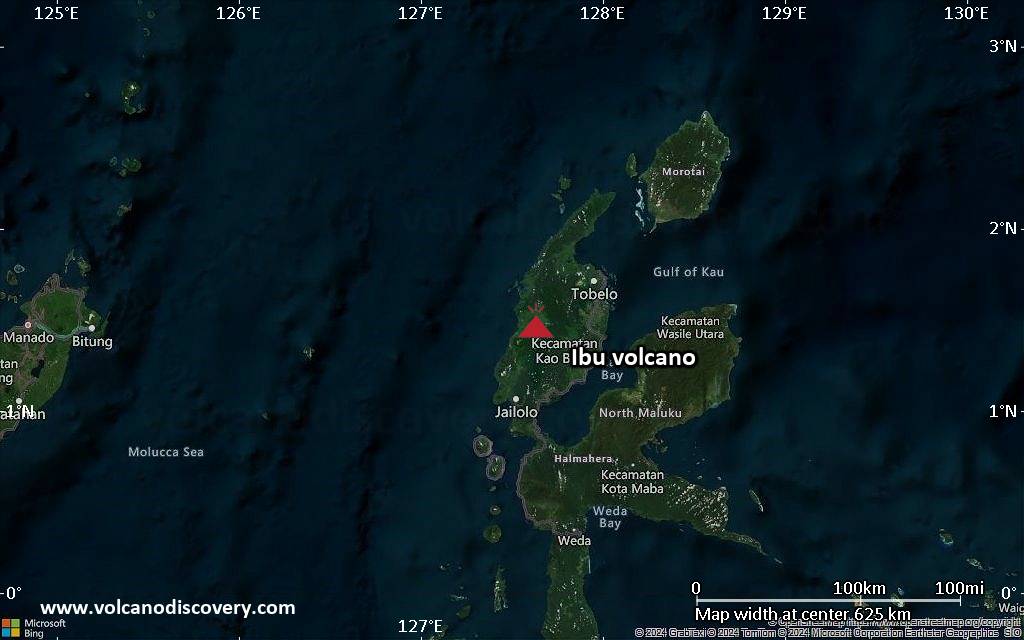Ein neuer Amnesty-Bericht dokumentiert massive Grundrechtsverletzungen durch die US-Regierung unter Präsident Donald Trump.
Ibu Volcano Volcanic Ash Advisory: VA TO FL060 OBS AT 19/2250Z MOV SE OBS VA DTG: 19/2250Z to 6000 ft (1800 m)

Explosive activity continues. Volcanic Ash Advisory Center (VAAC) Darwin warned about a volcanic ash plume that rose up to estimated 6000 ft (1800 m) altitude or flight level 060 .
The full report is as follows:
FVAU01 at 23:08 UTC, 19/01/26 from ADRM
VA ADVISORY
DTG: 20260119/2310Z
VAAC: DARWIN
VOLCANO: IBU 268030
PSN: N0129 E12738
AREA: INDONESIA
SOURCE ELEV: 1325M AMSL
ADVISORY NR: 2026/76
INFO SOURCE: CVGHM, HIMAWARI-9
ERUPTION DETAILS: VA TO FL060 OBS AT 19/2250Z MOV SE
OBS VA DTG: 19/2250Z
OBS VA CLD: SFC/FL060 N0129 E12731 – N0136 E12736 – N0114
E12846 – N0048 E12828 MOV SE 25KT
FCST VA CLD +6 HR: 20/0450Z SFC/FL060 N0130 E12733 – N0137
E12737 – N0113 E12844 – N0047 E12829
FCST VA CLD +12 HR: 20/1050Z SFC/FL060 N0130 E12732 – N0137
E12736 – N0114 E12848 – N0044 E12831
FCST VA CLD +18 HR: 20/1650Z SFC/FL060 N0129 E12731 – N0135
E12736 – N0108 E12847 – N0042 E12829
RMK: DISCRETE VA EMISSIONS OBS ON LATEST SATELLITE IMAGERY.
ONGOING VA EMISSIONS ARE EXPECTED. VA HEIGHT AND MOVEMENT
BASED ON GROUND REPORTS, SATELLITE IMAGE AND MODEL GUIDANCE.
NXT ADVISORY: NO LATER THAN 20260120/0510Z=
Green forest fire notification in Gambia
Semeru Volcano Volcanic Ash Advisory: ERUPTION LAST REPORTED AT 19/0638Z EST VA DTG: 19/1740Z

Volcanic Ash Advisory Center Darwin (VAAC) issued the following report:
FVAU02 at 17:59 UTC, 19/01/26 from ADRM
VA ADVISORY
DTG: 20260119/1800Z
VAAC: DARWIN
VOLCANO: SEMERU 263300
PSN: S0806 E11255
AREA: INDONESIA
SOURCE ELEV: 3657M AMSL
ADVISORY NR: 2026/77
INFO SOURCE: CVGHM, HIMAWARI-9
ERUPTION DETAILS: ERUPTION LAST REPORTED AT 19/0638Z
EST VA DTG: 19/1740Z
EST VA CLD: SFC/FL150 S0808 E11254 – S0804 E11251 – S0738
E11315 – S0758 E11330 MOV NE 10KT
FCST VA CLD +6 HR: 19/2340Z SFC/FL150 S0810 E11255 – S0805
E11250 – S0736 E11309 – S0753 E11329
FCST VA CLD +12 HR: 20/0540Z SFC/FL150 S0809 E11254 – S0805
E11250 – S0736 E11309 – S0757 E11328
FCST VA CLD +18 HR: 20/1140Z SFC/FL150 S0809 E11253 – S0804
E11250 – S0740 E11315 – S0758 E11329
RMK: VA NOT IDENTIFIABLE ON CURRENT SATELLITE IMAGERY DUE TO
MET CLOUD, HOWEVER RECENT GROUND REPORTS INDICATE
INTERMITTENT DISCRETE ERUPTIONS ARE ONGOING. VA HEIGHT AND
MOVEMENT BASED ON GROUND REPORTS AND MODEL GUIDANCE.
NXT ADVISORY: NO LATER THAN 20260120/0000Z=
Cuba: One year after selective releases, we demand the immediate release of people detained for political reasons
After a year of opaque selective releases in Cuba, Amnesty International said:
“The Cuban authorities have an obligation to guarantee the full and unconditional freedom of all prisoners of conscience. Sayli Navarro Álvarez, Félix Navarro, Loreto Hernández García, Donaida Pérez Paseiro, Roberto Pérez Fonseca, Maykel Castillo Pérez (Maykel ‘Osorbo’), and Luis Manuel Otero Alcántara must not spend another day in prison. The authorities must also put an end, once and for all, to detentions for political reasons,” said Ana Piquer, Amnesty International’s Regional Director for the Americas.
Sayli Navarro Álvarez, Félix Navarro, Loreto Hernández García, Donaida Pérez Paseiro, Roberto Pérez Fonseca, Maykel Castillo Pérez (Maykel ‘Osorbo’), and Luis Manuel Otero Alcántara must not spend another day in prison.”
Ana Piquer, Amnesty International’s Regional Director for the Americas.
The release process announced by the Cuban authorities on 14 January 2025 was marked by opacity, lack of public information, absence of clear criteria and the use of arbitrary conditions, as well as a devastating psychological impact on families. Moreover, the process did not include any state recognition of the abuses committed during arrests and convictions, nor did it provide guarantees of non-repetition.
“Some of the people released in 2025 were forced into exile, while others were returned to prison, exposing the persistence of deeply entrenched authoritarian practices and the absence of guarantees to exercise human rights inside the country without fear of reprisals.”
“Although this process resulted in the release of at least 211 people detained for political reasons, selective or conditional releases do not replace the authorities’ obligation to end the criminalization of freedom of expression or to guarantee the right to a fair trial.”
“Cuba must free, without conditions, those who never should have been imprisoned. President Díaz-Canel must take an unequivocal decision: end the use of the criminal justice system to silence criticism and punish activism. It is time to put an end to the repression of those who peacefully exercise their rights to freedom of expression, association and peaceful assembly,” Ana Piquer concluded.
Cuba must free, without conditions, those who never should have been imprisoned. President Díaz-Canel must take an unequivocal decision: end the use of the criminal justice system to silence criticism and punish activism.”
Ana Piquer, Amnesty International’s Regional Director for the Americas.
For further information or to arrange an interview, please contact press@amnesty.org
The post Cuba: One year after selective releases, we demand the immediate release of people detained for political reasons appeared first on Amnesty International.
